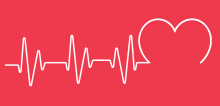Sudden Cardiac Arrest Awareness Month

When the heart experiences a disturbance that disrupts its pumping action it ceases blood flow to the rest of the body, which triggers a sudden, unexpected loss of heart function, breathing, and consciousness. This is known as sudden cardiac arrest.
Sudden cardiac arrest differs from a heart attack. Heart attacks occur when blood flow to a portion of the heart is blocked. However, heart attacks can spur a disturbance that leads to sudden cardiac arrest. Sudden cardiac arrest is a dire situation and requires immediate attention. Fast, appropriate care increases survival odds. With it being Sudden Cardiac Arrest Awareness Month, let’s delve into what that fast, appropriate care looks like and how to recognize if someone is experiencing this traumatic event.
Symptoms are drastic and immediate. Someone experiencing sudden cardiac arrest collapses, loses a pulse, stops breathing, and is unconscious. Occasionally there are visible symptoms that precede sudden cardiac arrest, such as: fatigue, fainting, blackouts, dizziness, chest pain, shortness of breath, weakness, palpitations, and vomiting. If you experience these symptoms and they are on-going seek medical attention immediately.
If you witness someone experiencing this event, we can’t express enough how critical it is to swiftly act. A halted heart can cause brain damage within a few minutes and death or permanent brain damage can occur within four to six minutes.
Obviously, you dial 9-1-1 instantly – but just waiting around for professional medical help to arrive isn’t enough. Check the unconscious person’s breathing – if they aren’t breathing normally commence CPR. Hopefully, however, there is an automated external defibrillator (AED) on the scene. These portable devices check heart rhythms and sends an electric shock to the heart in an attempt to restore a normal rhythm. AEDs are lightweight, battery-operated and easy to use. Many public spaces, from golf courses to hotels, are starting to add them.
Recognizing a sudden cardiac arrest event and knowing how to proceed can potentially save a life. Furthermore, use Sudden Cardiac Arrest Awareness Month as means to know where AEDs are in your community and workplace. If they are lacking, consider leading the effort in making that change!
Story Credit: https://www.memorialhealthcare.org/news/sudden-cardiac-arrest-awareness-month


